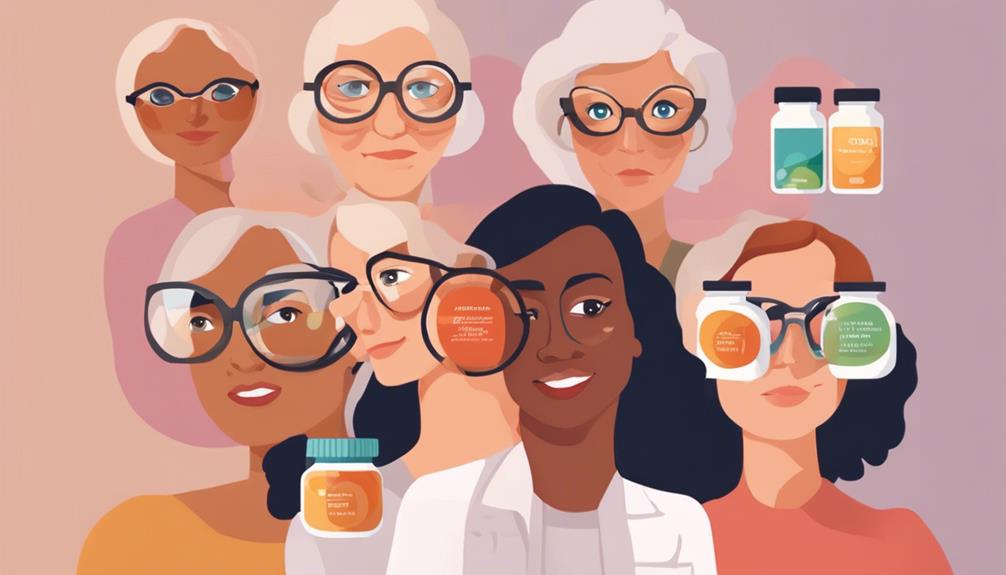
When it comes to maintaining optimal eye health and vision, incorporating top supplements tailored specifically for women can be crucial. From essential nutrients like Vitamin A and Omega-3 Fatty Acids to powerful antioxidants such as Lutein and Zeaxanthin, these supplements can provide a significant boost to your eye health regimen. But what makes these supplements particularly beneficial for women's eye health? Stay tuned to uncover the key factors behind these top supplements and how they can help you safeguard your vision for the future.
Importance of Eye Health
Ensuring optimal eye health is crucial for maintaining overall well-being. Your eyes are precious organs that allow you to experience the world around you. By implementing preventive measures and making simple lifestyle changes, you can significantly reduce the risk of developing eye conditions and maintain good vision throughout your life.
To protect your eyes, start by scheduling regular eye exams with an optometrist or ophthalmologist. These exams can detect any potential issues early on and allow for timely intervention.
Additionally, wearing sunglasses that block UV rays can help prevent damage from the sun's harmful effects. Remember to take breaks when using digital devices for extended periods to reduce eye strain and fatigue.
Incorporating foods rich in nutrients like lutein and zeaxanthin, such as leafy greens, eggs, and colorful fruits and vegetables, into your diet can also support eye health.
Vitamin A and Beta-Carotene
For optimal eye health, incorporating Vitamin A and beta-carotene into your diet is essential. Vitamin A plays a crucial role in maintaining good vision and eye health. It helps with night vision, protects the cornea, and is a component of rhodopsin, a protein in the eye that helps you see in low light conditions.
Beta-carotene, a precursor to Vitamin A, acts as a powerful antioxidant that helps protect the eyes from damage caused by free radicals.
Food sources rich in Vitamin A and beta-carotene include carrots, sweet potatoes, spinach, kale, and cantaloupe. Consuming these foods regularly can help ensure you're meeting your daily intake requirements.
For women, the recommended daily intake of Vitamin A is around 700-900 micrograms, while beta-carotene requirements can vary. It's important to consult with your healthcare provider to determine the appropriate amounts for your individual needs.
Omega-3 Fatty Acids
To further support your eye health, consider incorporating Omega-3 fatty acids into your diet. Omega-3 fatty acids, particularly DHA, play a crucial role in maintaining optimal eye function. DHA benefits include supporting retinal health and promoting proper visual development.
One of the best sources of Omega-3 fatty acids is fish oil, which contains high levels of DHA. Research suggests that a diet rich in Omega-3 fatty acids may help reduce the risk of age-related macular degeneration, a condition that can lead to vision loss.
Lutein and Zeaxanthin
When it comes to supporting your eye health, incorporating lutein and zeaxanthin into your daily routine can offer significant benefits. These powerful antioxidants are crucial for maintaining optimal vision and protecting your eyes from various age-related issues. Here's why they're essential for your eye health:
- Blue Light Protection: Lutein and zeaxanthin act as natural filters, helping to absorb harmful blue light that can cause eye strain and discomfort from digital screens.
- Macular Degeneration Prevention: These compounds accumulate in the macula, the central part of the retina, and help protect it from damage, reducing the risk of macular degeneration.
- Enhanced Visual Performance: Lutein and zeaxanthin contribute to improved contrast sensitivity and glare recovery, enhancing your overall visual acuity.
- Optimal Retinal Health: By reducing oxidative stress and inflammation in the retina, these nutrients promote the long-term health of your eyes, maintaining clear and sharp vision.
Incorporating lutein and zeaxanthin into your daily supplement regimen can be a proactive step towards preserving your eyesight and keeping your vision sharp for years to come.
Vitamin C and E
Vitamin C and E play crucial roles in supporting optimal eye health and function. These essential vitamins offer a range of benefits, including antioxidant properties that help combat free radicals and protect the eyes from oxidative stress. Additionally, vitamin C and E contribute to maintaining healthy skin around the eyes, which is vital for overall eye health. Here is a breakdown of the benefits of these vitamins:
| Benefits | Vitamin C | Vitamin E |
|---|---|---|
| Antioxidant Benefits | – Fights free radicals that can damage eye cells | – Protects cells from oxidative damage |
| Skin Benefits | – Supports collagen production for skin elasticity | – Helps maintain skin hydration and overall skin health |
Incorporating foods rich in vitamin C such as citrus fruits, strawberries, and bell peppers, along with sources of vitamin E like almonds, spinach, and sunflower seeds, can aid in promoting eye health and maintaining youthful skin around the eyes.
Zinc and Copper
Ensuring adequate levels of zinc and copper in your diet is essential for maintaining optimal eye health. These trace minerals play crucial roles in supporting your vision and overall well-being.
Here are four key reasons why zinc and copper are vital for your eye health:
- Trace Minerals: Zinc and copper are essential trace minerals that act as cofactors for enzymes involved in antioxidant defense mechanisms in the eye.
- Antioxidant Balance: Zinc and copper work together to maintain the delicate balance of antioxidants in the eye, protecting against oxidative stress and damage.
- Macular Health: Zinc is particularly important for maintaining the health of the macula, the central part of the retina responsible for sharp, clear vision.
- Collaborative Function: Copper aids in the absorption and utilization of zinc, ensuring that these two minerals work synergistically to support optimal eye function.
Frequently Asked Questions
Can Supplements Reverse Existing Eye Conditions?
Supplements can enhance eye health, but reversing existing conditions varies. Some studies suggest certain supplements might slow or prevent further damage, not fully reverse it. Consult an eye care professional for personalized advice.
Are There Specific Supplements for Dry Eyes?
Combat dry eyes with effective natural remedies like fish oil and flaxseed oil. Embrace lifestyle changes such as proper hydration and reducing screen time. Stay vigilant and consult with your eye care professional for personalized recommendations.
Can Women of All Ages Benefit From These Supplements?
Yes, young women can benefit from these supplements for eye health. They may help maintain good vision and prevent issues as they age. Aging women especially benefit, as these supplements can aid in preventing age-related eye conditions.
How Long Does It Take to See Results?
Picture a gradual sunrise; realistic expectations for improvements in your vision. Consistent usage of supplements is key. Typically, noticeable changes may take a few weeks to months. Monitor progress diligently to appreciate the benefits fully.
Are There Any Side Effects to Be Aware Of?
When considering supplements, be aware of potential risks. Consult a healthcare provider for guidance. Long-term effects vary; monitor changes and discuss concerns promptly. Prioritize eye health and vision by staying informed and proactive.
Conclusion
In conclusion, ensuring you incorporate top supplements like Vitamin A, Beta-Carotene, Omega-3 Fatty Acids, Lutein, Zeaxanthin, Vitamin C, and Vitamin E into your diet is crucial for maintaining optimal eye health and vision. These nutrients play a vital role in supporting proper eye function and protecting against oxidative damage. Remember, an ounce of prevention is worth a pound of cure, so prioritize your eye health today to enjoy clear vision for years to come.





